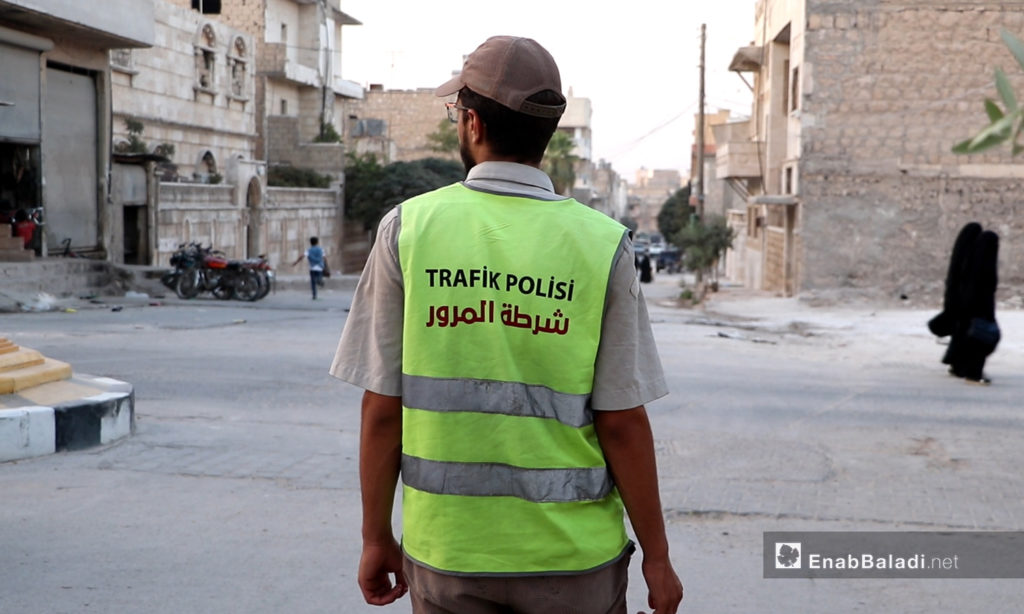Enab Baladi – Idlib / Aleppo
On pothole-filled roads, in the midst of traffic jams, Anas Watad was rapidly driving his motorcycle, enjoying his ride as he used to on Sarmade Road in the northern countryside of Idlib and while passing one turn after the other smoothly, a speeding truck hit him and ended his life at the last turn.
Anas Watad, a young man, displaced from the town of Ariha in the southern countryside of Idlib, was a victim of one of the dozens of monthly road traffic accidents taking place in northwestern Syria, which has been controlled by different management regimes that share the lack of traffic laws and the absence of their impact.
Unpaved roads and unorganized road traffic congestion
Between Idlib and the western and northern countryside of Aleppo, scenes of dirt roads, poorly paved streets, streets filled with potholes, vehicles, motorcycles, and pedestrians, were repeated several times.
Three years have passed since the so-called Islamic State (IS) forces were expelled from the city of al-Bab.
Still, the effects of the battles are clearly visible on its roads without little consideration given to rehabilitating roads, as complained by Majd al-Homsi during a survey conducted by Enab Baladi as part of the “What Is Your Problem” program about the absence of traffic control in his city, located in the northern countryside of Aleppo.
The city of al-Bab has no traffic lights, traffic control signs and signals in al-Bab city, or appropriate sidewalks for pedestrians, and, which makes traffic in a state of “chaos,” as Majd describes. This would also pose a danger to drivers and pedestrians alike.
Driving of a vehicle is said to require “morality, taste, and art.” The surveyed drivers said that traffic control is the responsibility of the drivers and their skills. They pointed to the danger posed by motorcycle riders’ wandering streets at high speed amid the absence of lane controls and allowing large vehicles to enter the city streets.
Adnan al-Imam told Enab Baladi that Idlib’s people are also complaining about the lack of traffic control even though the so-called Salvation Government imposes monetary penalties for traffic rules violations. However, traffic control is imposed by the SG only in the city, not including the countryside.
The Media Office of the Syrian Civil Defence (SCD) reported to Enab Baladi that 195 traffic accidents took place last August and September, which were responded to by the SCD volunteers in northwestern Syria, noting 120 of these accidents took place in the city of Idlib and three were in the city of al-Bab.
Firas Khalifa, a member of the Media Office of the SCD in Idlib, believes that the reasons for the spread of the traffic accidents are “ traffic jams, the large number of vehicles, the reckless and speedy driving of the vehicles.”
These accidents are frequent on the roads leading to Atme and Harem, the Idlib-Bab al-Hawa road, the Idlib-Ariha road, and the Jisr al-Shughour roads.
Besides, the region lacks public transportation. The motorcycle is considered the first means of transportation, being the fastest and most affordable in light of the high fuel prices; the motorcycle price does not exceed 380 USD.
Where is the law?
The director of the transportation directorate in al-Bab, Abdul Qader Khalaf, denied the absence of traffic law in the northern countryside of Aleppo, which is under Turkish administration. He said that traffic police are distributed in cities’ main streets to “advise” citizens not to drive too fast.
Reforms of traffic services in the region included the registration of vehicles since March 2019, the issuance of driving licenses and vehicle registration plates. Besides, driver training courses are held. Furthermore, the transportation department plans to install traffic signals and traffic lights on main and secondary roads.
In Idlib, the Traffic Branch official, First Lieutenant Muhammad al-Khidr, attributed the traffic accidents to “the lack of young people’s awareness; they recklessly drive cars and motorcycles without being bound by traffic rules and safety and compliance procedures.”
In his speech to Enab Baladi, he mentioned a lack of traffic police officers specialized in confiscating vehicles violating transportation and traffic law and verifying the causes of traffic accidents. When a traffic accident occurs, police patrols are supposed to reach the scene of the accident quickly. They take statements from the parties involved and non-involved witnesses, identify information, draw a diagram of the exact accident sites, take scene photos, and then author an automobile accident report.
The traffic police are not sufficiently supported in Idlib. The traffic police carry out awareness-raising projects and establish schools to teach vehicle driving and general traffic rules. The traffic police plan to establish traffic centers on highways, such as the Idlib-Sarmada road, whose mission is to monitor speed and follow up accidents as quickly as possible.











